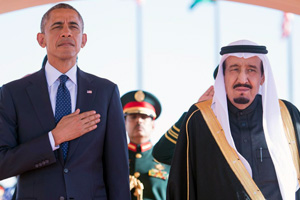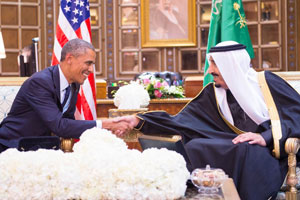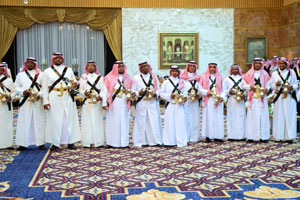President Barack Obama’s visit to Riyadh in conjunction with the post-funeral ceremonies for King Abdullah bin Abdulaziz could not have come at a time when the atmosphere was more receptive or the political moment more propitious.

The visit can be viewed within a twofold context. The first was largely positive. The second was negative and predictably given greater press coverage for reasons explained herein. In a different world, the latter would not have been discussed publicly given the circumstances surrounding the president’s visit to the kingdom.
In an interview only hours before he arrived to offer his condolences, President Obama violated ordinary diplomatic protocol by making critical comments about Saudi Arabia. In so doing, he made an unwelcomed impression on his hosts during a period of transition and mourning.
The president’s remarks in the interview ought not to be surprising. The reasons can be attributed to domestic pressures all American presidents are subjected to by the realities of U.S. political and electoral campaign finance dynamics, the media, and the powerful influence of special interest groups.
Two factors behind all three pressures as Americans approach new presidential elections have long been the liberal international interventionist wing of the Democratic Party and the traditional interests of various pro-Israeli and other American partisans opposed to the Saudi Arabian-American special relationship.
In this there is nothing new under the sun. U.S. and Saudi Arabian leaders readily acknowledge that American domestic political dynamics are at once a fact and a facet of the U.S.-Saudi Arabian relationship. Still, for Saudi Arabia’s leaders, who are managing a transfer of responsibilities upon the death of a leader who was Saudi Arabia’s de facto head of state for several decades, the remarks were poorly timed and poorly considered.
Positives from President Obama’s Visit
By making the visit, which was logistically and operationally convenient as he was already in India, President Obama avoided having portions of the international media criticize him for not being present at a major international gathering. To his credit, he joined many other sincere friends, allies, and strategic partners of Saudi Arabia to pay respect upon the passing of King Abdullah, who was widely respected and admired.

Given the circumstances, the president would have needed to travel to Riyadh sooner rather than later to carry out what responsible Great Power and other leaders are expected and required to do: to meet the new king face-to-face. He needed to take King Salman bin Abdalaziz’s measure, especially given the range of important issues and concerns they have in common and their need to have the strongest possible personal relationship. Only thus can one expect the all-important elements of reciprocal respect and trust – the essential ingredients in any vital strategic relationship – to be instilled and the groundwork laid for their maintenance.
With the government in neighboring Yemen having collapsed the day before, tilting that country even further than it already was in the direction of civil war, the president’s visit could hardly have come at a more timely and relevant juncture were it to be viewed from that perspective alone. The occasion allowed the two heads of state to discuss the implications for their needs, concerns, and key foreign policy objectives regarding a country in which both governments have invested heavily. Each needs to remain watchful for what may happen there in the immediate future that could affect their respective strategic and geopolitical interests.
Further, it goes without saying that the most important Great Power and regional power aligned to confront the so-called Islamic State in Iraq and Syria stood to benefit from their leaders sharing notes on the direction in which they are headed in their governments having undertaken jointly to fight this newest threat to the region’s security, stability, and prospects for prosperity.
Additionally, given their countries’ roles among the world’s most important oil producers, both leaders needed to consult regarding the challenges to themselves, Iran, Russia, and other countries from the falling international price for oil. Petroleum is Saudi Arabia’s primary source of national income, a key element of tax revenue for the American treasury, and a major means of expenditures in both countries made possible from their domestic and foreign sales of oil. For the United States, the decreased prices have hurt numerous companies that invested in developing America’s hydrocarbon fuel resources when the price was higher but cannot do so when it is as low as it is now. And in Saudi Arabia lower prices will inevitably mean smaller budgetary outlays for ongoing expenses and the government’s ability to meet the costs of a hitherto ambitious range of infrastructure and other development projects. Associated with the plight of both countries are the ensuing implications for their respective stock markets, levels of employment, and overall economic growth.
Negatives From the Visit
In a televised interview on CNN with Fareed Zakaria on the eve of his visit to the kingdom, the president implicitly criticized Saudi Arabia’s record on human rights. He acknowledged that there have been American efforts to press the kingdom’s leaders on the need for reforms in the realm of human rights in particular, “not just for our sake but more importantly for [Saudi Arabia’s] sake.” He noted that he has been making an argument to friends and allies that “they’re going to have to change how they do business.”

Such remarks by the leader of a country about an ally and strategic partner whose leaders he would be meeting with only hours after the interview would ordinarily be considered rude and therefore left unspoken. Especially considering the occasion of President Obama’s visit – paying respect to Saudi Arabia upon the passing of its head of state and the ascension of a new leader to that post – the remarks appeared to misunderstand the dynamics of the moment and the appropriate diplomatic protocol.
The slight was the more objectionable as not just Saudi Arabian officials but their counterparts in governments the world over, with the United States itself being the example par excellence, are almost universally of one view that people who live in glass houses should not throw stones.
Saudi Arabians might well point out that the United States would certainly not appreciate one of its allies doing something similar.
What if empathy were on parade and there was reciprocity? What if Riyadh spoke as openly about America’s universally condemned human rights record with regard to the Saudi Arabian and other prisoners held in captivity at Guantanamo Bay in Cuba who have not been charged with having committed a crime?
What if the kingdom’s representatives had provided as candid an interview the day before the president’s arrival about the documented torture inflicted by Americans upon Muslim prisoners at Bagram Air Base in Afghanistan, at Abu Ghraib and other prisons in Iraq during the eight-year U.S. occupation, and at secret rendition sites administered by CIA operatives in Europe and elsewhere?
[pullquote]The remarks appeared to misunderstand the dynamics of the moment and the appropriate diplomatic protocol.[/pullquote]What if before arriving to Washington a visiting counterpart to the U.S. president indicated in an interview that America’s unprovoked invasion and occupation of Iraq killed a country – and not just any country but one recognized as the birthplace of recorded human history, and which was once the zenith of Arab and Islamic culture and civilization?
What if, hours before arriving on American soil, another allied leader lamented the United States being the cause of two million Iraqi external refugees, another two million internally displaced Iraqis – the total, being a sixth of the Iraqi population or, in terms of an American equivalency, comparable to 50 million Americans being uprooted by the armed forces of another country as a result of an unprovoked U.S. invasion and occupation?
And what if the visitor added that, in so doing, the United States was also responsible for hundreds of thousands and perhaps millions of dead Iraqi civilians, sustained instability, the government in Baghdad becoming the most favorable to Tehran in modern Iranian history, and the principal reason for the rise of ISIS?
Or what if a Saudi Arabian head of state, en route to visiting his American counterpart in Washington, had given the day before his arrival an interview in which he made implicit but unmistakable reference to the reality that the U.S. has long aided and abetted Israel’s human rights violations of Palestinians seeking their inalienable right to a nationally sovereign, politically independent, and territorially intact state side by side Israel so as to be free of foreign military occupation and domination?
And what if such a visiting leader were to criticize Washington’s failure to curb Israel’s illegally seizing and bulldozing Palestinian Arab, Christian, and Muslim land, orchards, houses, and other resources to make way for Israeli Jewish-only settlements? Or were he to criticize the Israeli Defense Forces having bulldozed to death American peace activist Rachel Corrie? Or the extent to which, in his view, Israel and the United States together bulldozed something else: the so-called peace process, which he chose to refer to as nothing more than a diplomatic process because to call it a peace process would, in his words, be a misnomer – with all the attendant dire results their failure has had and continues to have for the regional prospects – for Arabs and Jews, for Christians and Muslims – for peace at any time in the foreseeable future?
The Saudi Arabian-U.S. Partnership Moving Forward
Within the two contexts offered here – as but one way among others in which to view President Obama’s visit to Riyadh, and with the one predictably portrayed by the media to a longer extent than the other – it is clear that the positive facets far outweigh the negative. The reason is that, at the end of the day, the negative facets are mainly in the realm of words, which, with one exception, remained unspoken. The positive facets, however, are the opposite. They pertain to tangible real life and death issues affecting the lives and legitimate interests of hundreds of millions. There is no comparison between the two.
In any event, President Obama has the means with which to convey an appropriate apology for his condescending statements. Were he to do so, the chances are great that it would be accepted with grace and all would be forgiven. Certainly, Obama’s Saudi Arabian counterpart is widely experienced in such matters. Having been in public life and in his country’s relationship with the United States for more than half a century, this is not the first time that he has heard presidents say things to the media that they wished they had said in private or not at all. Nor, given the propensity and history of American leaders to interfere orally and otherwise in the domestic affairs of other countries, is it likely to be the last time.
*****************************
Dr. John Duke Anthony is the Founding President & CEO of the National Council on U.S.-Arab Relations.
